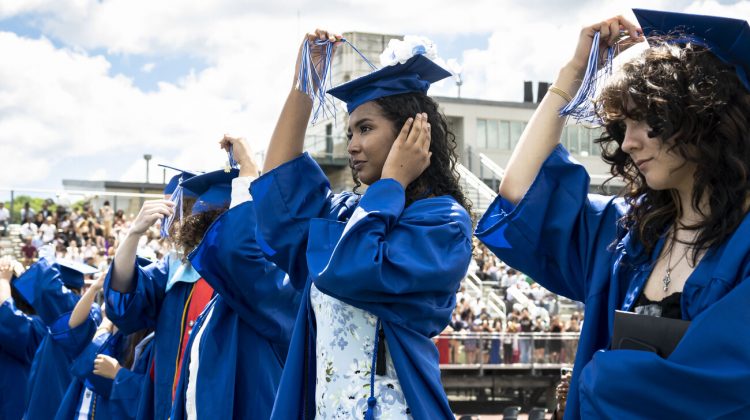LYNN — KIPP Academy Lynn Charter School (KALCS) submitted an application to the Board of Elementary and Secondary Education Tuesday to change the maximum number of enrollment from 1,586 to 2,947.
In a letter attached to a 173 page application evaluating the school’s eligibility to nearly double its enrollment, Chair of KALCS Board of Trustees Stephanie Pierre-Louis wrote that the charter school spent 20 years “creating and strengthening learning experiences for the students of Lynn.
“With increased enrollment, KALCS intends to leverage scale to more deeply execute on its key design elements of high-quality instruction, character development, family engagement and college and career readiness for all students and, in the end, ensure that even more students are on a path to a fulfilled life,” the letter continues.
Due to Lynn Public Schools being ranked in the lowest 10 percent of districts in the state by the Department of Elementary and Secondary Education based on MCAS scores, the amount of Chapter 70 funding that can be directed to charter schools increases from nine to 18 percent.
If KIPP Academy were to be approved for the maximum number of additional seats, LPS would lose $24 million in Chapter 70 revenue in addition to the $30 million that is currently directed to charter school tuition, bringing the total to $54 million.
In a statement to the The Item, a spokesperson for KIPP Lynn said the reason they filed an amendment to expand the charter enrollment is due to its waitlist which currently has more than 1,700 students on it.
“We are committed to pursuing the opportunity to expand our impact by bringing joyful, academically excellent spaces to more children in Lynn,” the statement read. “With the support of our families and community partners, we seek to expand the number of students served in Grades Pre-K-12.”
The application also highlights how the waitlist continues to grow by approximately 2% every year, despite seeing steady applications and a “slight dip” in applications during the COVID-19 pandemic.
Other factors of enrollment it addresses is low student attrition, and the school’s inability to consistently meet sibling interest.
In the application, Pierre-Louis highlighted the charter’s “track record of strong outcomes” for its students, “especially when considering peer match groups across the state, specifically with African American/Black & Hispanic/Latino students.”
The application also emphasizes how it engaged with stakeholders in the Lynn community such as the school’s families, teachers and staff before applying for expansion.
Superintendent of Schools Dr. Evonne Alvarez, who wrote a letter to the Department of Elementary and Secondary Education expressing the public school district’s strong opposition to the potential increase in the number of charter school seats at KIPP, emphasized how a decision to direct more funding to the charter would be “devastating” to the district.
“We are proud of our work and know we will continue to improve,” she wrote in her letter. “In the interest of fairness and equity, we look forward to understanding how we can partner to better support the future of our students.”
Alvarez highlighted pieces of the charter’s application that did not equitably compare the charter to the public school district.
For example, she said the charter is highlighting African American/Black and Hispanic/Latino students’ success in consideration to peer match groups across the state, but it is “critically important” they also consider the success of peer match groups within the public school district.
She added when comparing the public school district to the charter school, “numbers matter.” Alvarez recognized the district’s 15% of students who are newcomers and its approximately 10% of students who are classified as homeless.
According to a report published by the Annenburg Institute in 2023, LPS has enrolled more newcomers than any district in the state except Boston.
She added due to the charter’s application deadline, newcomer students do not have equal opportunity to enroll at KALCS, and its enrollment of students who are classified as newcomers is lower.
Alvarez said the district continues to enroll students to all schools throughout the year and at the rate at which it is enrolling students this year, it is projected the district which serves approximately 17,100 students will reach an enrollment of 18,000 next year.
She also highlighted a comparison between the public school district’s growth in the annual-criterion referenced target percentage between MCAS accountability reports. The public school district increased from 34% in 2023 to 55% in 2024, whereas the charter school decreased from 48% in 2023 to 43% in 2024. For cumulative progress toward improving goals both the public school district and the charter school were classified as making moderate progress toward improving goals.
“Our teachers in our public schools teach and support all students, regardless of
the characteristics that the state may give them for accountability purposes, such as low income (students), English learners, and students with disabilities,” Alvarez added.

